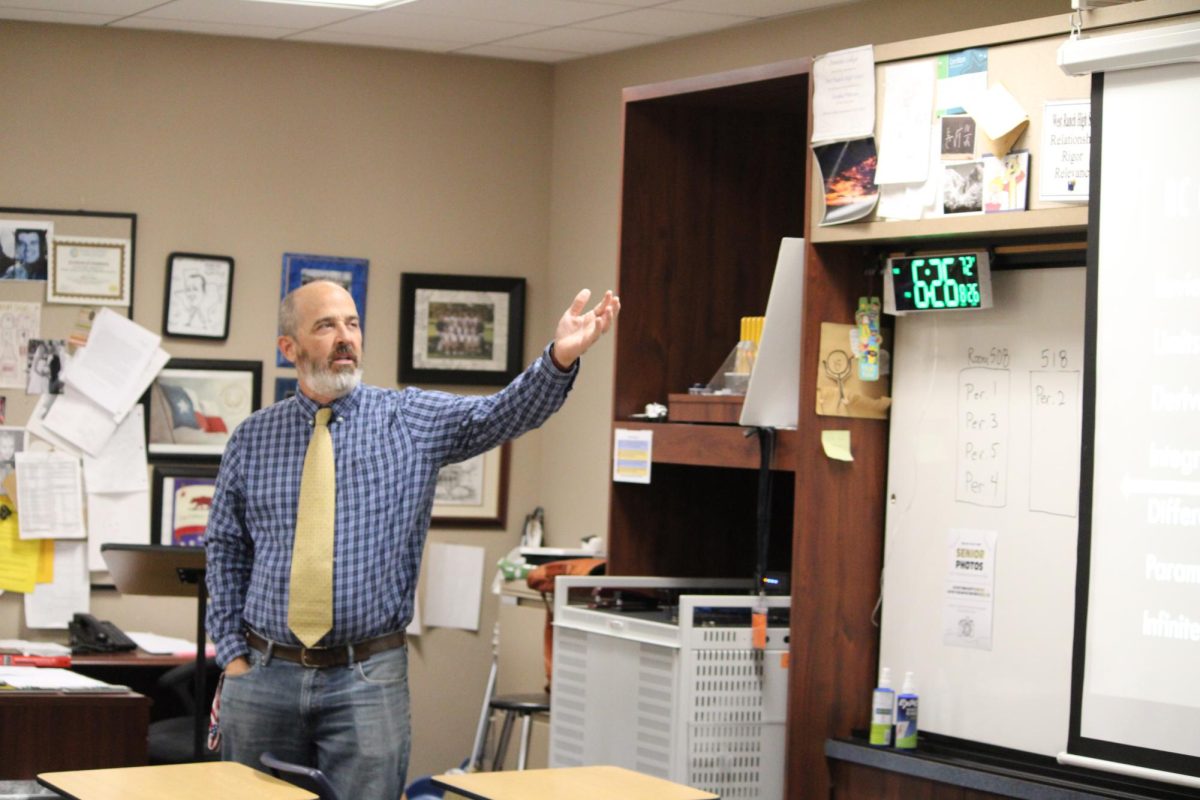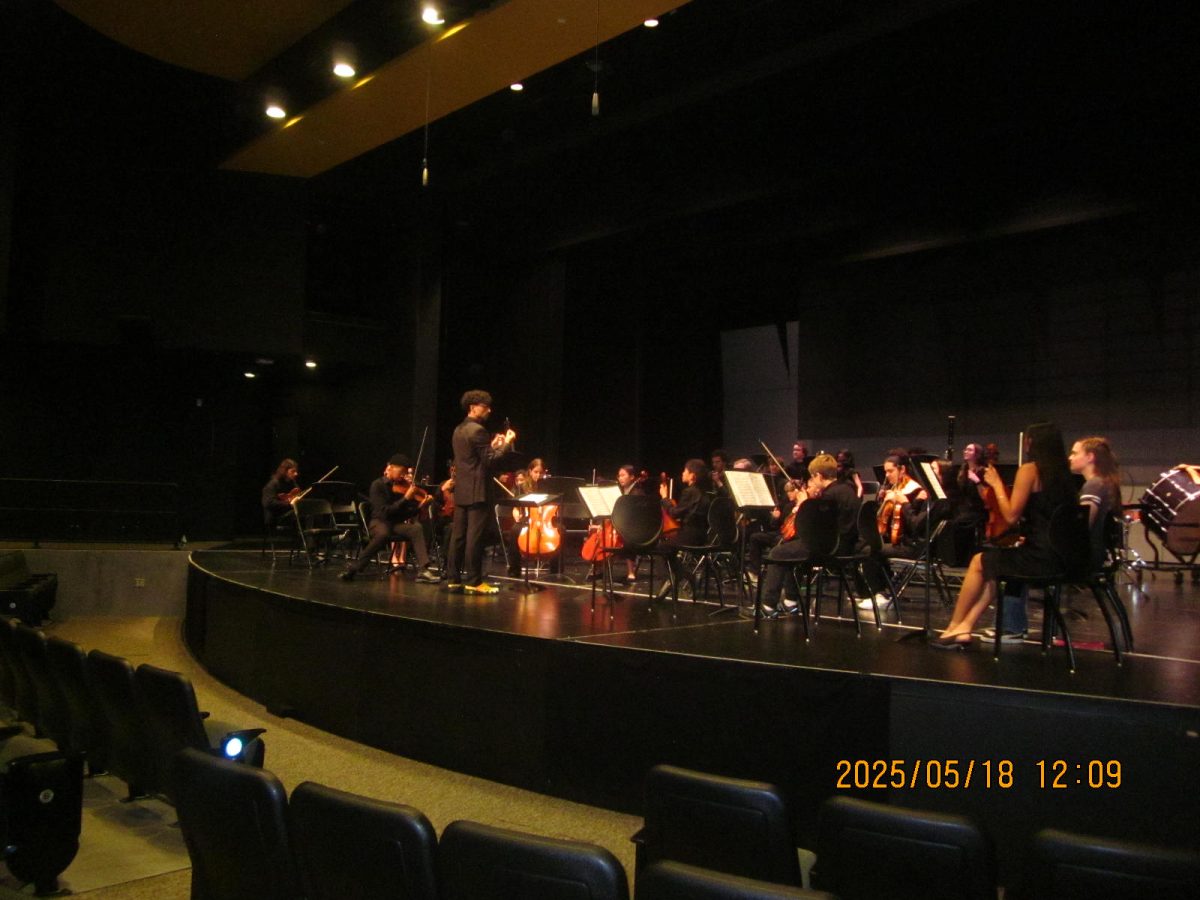High school often serves as an opportunity to learn and a gateway to professional life. To broaden Wildcats’ understanding of preparing for life outside of West Ranch, the Junior class had the opportunity to visit College of the Canyons on Sept. 20 for a business conference called Connecting to Success.
To get to College of the Canyons, Juniors gathered in the theater foyer at 8:20 AM, received a brief address from Mrs. Moscoe and were grouped into buses. Upon arriving at the destination, Corey Curties, the founder of GC Group Counseling, a personal development company, welcomed students with an opening speech.
Groups were then dismissed to enjoy a quick snack in the Honor Grove followed by a breakout session related to public image and money management. In one particular lecture, Emily McConnaughy, a member of SERVPRO, and Ricki Macken Chilvers, Executive Director of Pleasant View Industries, discussed the three basic steps of maintaining a positive professional life: good first impressions, communication and effective problem-solving.
The pair initially discussed the critical importance of first impressions. An individual’s first perception of a person is invaluable to a long-term relationship, yet just how fast this perception is and how to create a positive impression is far more obscure. To simplify this process, the two speakers created three primary areas in which individuals can shape a good first perception of themselves:
The first aspect was social media. Digital forums have risen to prominence and are essential to an individual’s public life and self-expression. However, McConnaughy underlined how poor representations of oneself leave a permanent stain on one’s record. Mrs. Moscoe elaborated, “When you apply for a job, and we even do it here, if the person attended one of the schools in our district, we can look back at their discipline file, we can look at their social media, we can look at all the things, so I would think that for right now, it would be how they are branding themselves and are they branding themselves in a way that’s going to lead to their future career.” It is important to understand that what is on social media will be there forever, so being thoughtful about what to post is crucial in preventing any future damage to your brand.
The second aspect was professionalism. In most work-related settings, a level of formality is implied even when such a request is not explicitly made. For example, Chilvers discussed that in interviews, many employers may perceive applicants in casual attire less favorably than those in formal clothing. Specific garments discussed were ripped clothing, crop tops, shorts and sandals. However, scrutiny within professionalism does not merely extend to one’s clothing; speech is also a critical element in demonstrating formality. Slang, while acceptable among friends, should be refrained from use during professional settings, such as in board meetings.
The last element is cultural fit. Every organization, including West Ranch, has its unique norms and traditions that shape how its members behave. Within the presentation it was stated to create a good impression and present oneself effectively, individuals should consider researching different organizations’ traditions. Most employers are more likely to accept an applicant who is compatible with a company’s norms than one who would likely see a conflict with it. For some West Ranch students, this point gave significant insight into their imminent futures. Junior Somesh Sharma Sriprasanna stated, “I was thinking about which college I wanted to go to, which ones I would apply for, and how I would do it. I never thought how their culture could play a role. Now, when I apply, I am going to do some research into the culture of different campuses and how I can show alignment with them.” Sriprasanna’s approach could also apply to other West Ranch students, not only in applying to potential universities and careers but also in student organizations, clubs or extracurricular activities.
After completing the lecture on first impressions, McConnaughy and Chilvers discussed the importance of one’s behavior, particularly relating to confidence and communication. Competence is best demonstrated through one’s accomplishments. While everyone’s recipe for success varies, the speakers established that there is one key factor that could hinder one’s work: distractions. To combat losing focus, the speakers suggested students establish boundaries, minimize notifications, schedule breaks, and prioritize single-tasking.
Second came the briefing about communication. When speaking with another individual, communication splits into two distinct segments: verbal and nonverbal. Verbal communication refers to aspects of speech that directly relate to what one is discussing, such as tone, methods of persuasion, syntax, formality and volume. The second element is nonverbal, an aspect of communication that has far less notoriety but makes up 70 percent of communications. Nonverbal communication encompasses facial expression, body language, hand gestures and stance.
McConnaughy and Chilvers suggested that to master effective verbal communication, students should emphasize different words within their conversation, ask questions after one has finished speaking and incorporate summaries of another person’s message to demonstrate engagement. In regards to non-verbal communication, the speakers encouraged students to lean in, make eye contact and nod to show interest. Establishing that one cares about what the other is saying is critical in continuing a conversation and ensures that the speaker feels respected and heard. Junior Sameer Shirazi emphasized, “It matters how you approach people; first impressions go a long way. I took away that people respond to body language, such as the way you sit, walk, talk and even dress.”
To effectively solve problems, Chilvers suggested six steps that students can follow: identify and analyze the problem, generate possible solutions, evaluate the possible solutions in regards to feasibility and risk to gain, identify and select the solution that best aligns with one’s goals, implement the solution and lastly, reflect and learn from the experience to ensure the same problem does not happen twice.
Following this captivating and informative discussion, it was time for a quick game of Economics Jeopardy, hosted by analyst Eric Abrahamian and financial advisor Rian Denich from Prosperitas Financials. The Categories were ‘Banking 101,’ ‘What Expenses?,’ ‘But I Had a Credit Card,’ and ‘Save Me,’ each discussing economics in relation to high schoolers and graduates. Students gained valuable insights and experienced firsthand how financial literacy can be both educational and engaging.
Early understanding of good financial skills is critical for anyone seeking a stable financial future. Both speakers emphasized the importance of early awareness and discipline. Denich suggested, “I think the number one thing that I think high schoolers can start doing to put themselves apart is understanding their spending habits.” He also noted that many people carry poor financial habits into adulthood, adding, “I see it, you know, people in their 40s are still living in those same habits that I had maybe when I was 17 or 18 years old.” Abrahamian also described the power of compound interest, comparing it to a snowball rolling down a hill: “If you’re 18 years old, you have a very big hill of time that snowball continues to roll and picks up more snow and grows larger and larger.” Mr. Denich concluded that “if you can just get into the habit of understanding your spending, creating some sort of budget, and making sure you save a bit out of every paycheck you get and invest that money, that’s going to put you miles ahead of the rest.”
Chilvers echoed this sentiment and stated, “We wish that somebody would have shared that information with us when we were younger so that we would have been able to learn from it earlier on, rather than learning it now. I think that’s why we’re all here presenting.”
Upon the conclusion of the breakout session, the students were given a brief Q&A session with the three industry speakers which included YouTuber Jeff Emmert, Local Jersey Mike’s franchise owner Kyanna Isaacson and Film producer Jennie Lew Tugend. The three shared their varying stories of success and answered questions. Afterwards, Curties gave a brief closing address and students were sent back to West Ranch.
The Connecting to Success event provided junior Wildcats with invaluable insights into building a professional future. Students gained practical tools to improve first impressions, effective communication and sound financial habits by engaging in lectures and interactive sessions.







